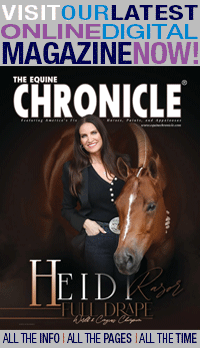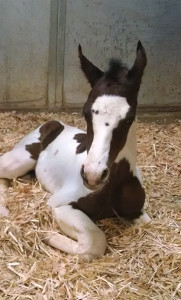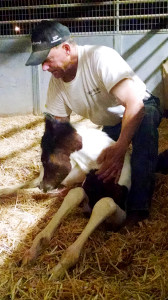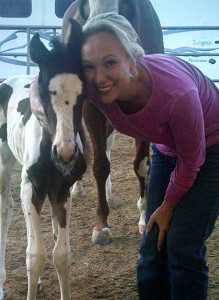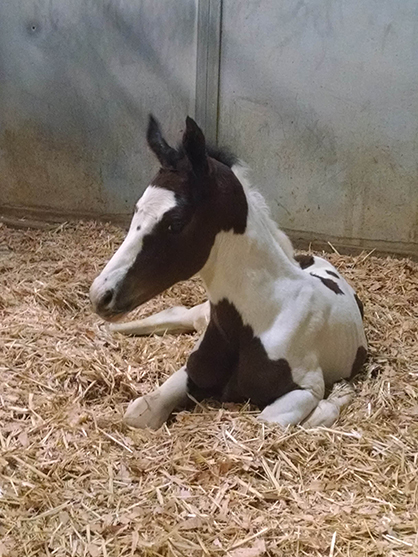Never the Same- A Personal Blog on the Loss of a Foal
By: Delores Kuhlwein
There’s a saying my husband Mark and I utter when, as volunteers of a horse club, we want to relieve some stress. Sometimes, if we’ve been treated poorly, or when we think we may have lost sight of the big picture, we laugh and say, “It’s just a horse show; it’s not life or death!”
But then, sometimes, it is life or death, and it hits us when we least expect it.
On Tuesday, April 26th, we lost a precious, 20-day-old filly, and like every other horse breeder out there, we had waited a long time for this second cross from my beloved mare and out of our favorite APHA stallion.
A Day of Promise
The foaling on April 6, 2016 went off without a hitch. It took place exactly on my mare’s due date, with no stress, and a delivery of a huge, healthy, long-legged filly with color! Mark, who’s handled newborn foals more times than he can count, proclaimed it was the easiest delivery he’d ever seen. To top it off, it was our 9th anniversary. After researching the traditional gift for celebration, we named her Willow; it was a befitting name for a tall, lanky, delicate beauty.
My mare, Lucy, did everything right. Willow got up and nursed, her IgG levels were good, and, like her brother, she loped everywhere. We couldn’t believe our good fortune and blessing, as this baby was extreme-legged and a girl this time! Then, around day two or three, we noticed some diarrhea from the foal. It was unusual this early, I thought, since it wasn’t time for foal heat from the mare, but we tried not to overreact. When it didn’t subside right away, we consulted with our vet and administered the prescribed medication.
Unexpected Foreshadowing
I have to take pause here, as I had just written an article about Foal Water Drinking Syndrome for The Equine Chronicle (January/February 2016), and it concerned foals substituting water for nursing. They can die if it’s not caught soon enough, because it causes debilitating diarrhea and opens the door to bacteria. Our breeding manager, upon hearing of the foal’s symptoms, warned me immediately to make sure she couldn’t reach water. I scoffed, thinking I hadn’t seen any of that behavior and I’d been watching closely, since I, of all people, knew about the condition. But, when my husband went out to the barn that evening, guess whose face was in the automatic waterer? My beloved Willow.
We quickly closed off the waterer and hung buckets up high, and life seemed to return to normal. We breathed a sigh of relief since we had caught the culprit in time. Willow began bucking and playing harder when she was a week old, but we insisted on having our vet check her anyway. We received a call while we were out of town. He was concerned she seemed a bit listless, so bloodwork was done and antibiotics were administered. We made our way home late at night, and Willow seemed a little sore but okay – we agreed to monitor her and hoped it was a reaction to the shot.
The Big Scare
We stumbled sleepily out to the barn early the next morning, thinking we had a normal day’s work ahead, only to find a lame and stiff filly. An immediate call to the vet resulted in a rushed haul to the veterinary hospital. It seemed an infection had developed, probably through the umbilical cord. The fight was now on to save her hocks and knees, since a septic infection attacks the joints. Over the course of the next week, after a hurried surgery to remove the umbilical cord, numerous tests, flushing of joints, and more, we thought we’d beaten the infection and that it was a “wimpy” bug as the surgeon had hoped. The antibiotics were the right ones, tests showed. Plus, the filly was a fighter. Throughout all the poking, prodding, and trauma of the long stay, she was up bucking in her stall at midnight, the staff reported happily.
I was out of town working when another call came that the goal had changed. Now, we were fighting no longer just to save her joints and future show career, but to save her life. We made the decision to move forward, despite a looming and very scary hospital bill that we had no idea how to pay.
The doubt started to grow in my mind – did I cause this? Is there something we should have done sooner? Had I been irresponsible? We disinfected the umbilical cord and had tested her IgG levels. We took what I thought were all the appropriate steps. Did we miss something or not react correctly after all these years of having foals?
The tests came back showing E.coli as one of the bacteria present, and we asked the vet if the diarrhea could’ve contaminated the umbilical cord. Yes, was the answer, or she could have lain in manure or any number of things, since the cord was basically an open pore susceptible to anything. It didn’t ease my mind, and I spent the day struggling and anxious while putting on a happy face at work, while worrying about Willow and my mare. I finally prayed to God and told him that I would accept whatever he decided, knowing I wasn’t in control.
My husband visited Willow in the hospital the next morning. He reported to me that her eyes were bright, and she was up nursing and playing. We concluded she would probably have a future as a broodmare, due to the amount of white blood cells that had stayed present in her knee joints, but we knew after seeing her fight that we’d done the right thing. The surgeon and I agreed we could bring her home the following Tuesday and continue antibiotics orally.
A Change in Plans
On Tuesday, we rushed around getting ready to meet the vet for the big day. I was excited but scared at the thought of treating Willow on my own. Then, my cell phone rang. It was the surgeon telling me that Willow wouldn’t be able to come home. The damage had been too great, and the bug was winning. When I arrived at the hospital, still in disbelief, Willow didn’t get up, and Lucy’s eyes were dull and accepting. When she finally got up to nurse, she demonstrated great pain and extreme lameness. Mark and I sadly said our goodbyes, and I held Willow as she passed. The surgeon and I both cried together at the loss.
Lucy, who had been standing over her in a knowing way, was ready to go, pushing out of her stall to get into the trailer. She was quiet on the way home, sedated and tired. My heart ached for her, yet I felt helpless and lost, as she didn’t want affection like she always did.
One Tick at a Time
Looking back, I had stayed a little more detached about this second pregnancy of Lucy’s. At first, I told myself it was because life had become overwhelmingly full, or maybe because this time I wasn’t showing Lucy and had another show horse. I now wonder if I knew something was going to go wrong, or if it was just coincidence, even though I don’t believe in such things.
Although I sobbed like a child at Willow’s loss, and still am struggling to accept that she will no longer be there when I walk out to the barn, and will never have that promising show career we wanted for her, and for us, I have accepted it – or maybe I’m just numb.
Friends have rallied around us, as well as family, but what we do realize is the struggle will always be our own and no one can go through that pain for us. One of the ways Mark helped me the most after one of our geldings died, an event that almost seemed to incapacitate me at first, was to say, “Don’t forget that the other horses still need you.” I’m trying to keep that in mind each day while I push away thoughts of what I should have done differently to save Willow. When asked how I’m doing, I say I’m just putting one foot in front of the other.
Most of all, we’re hoping that the fear and anxiety we feel about the next foal, already growing inside of Lucy, will soon turn into delight and wonder. Babies do seem to have that effect, and each spring our spirit and optimism is renewed.
I think, as you lose more horses in life, it gets easier on some obscure level; but, it seems to taint you forever. In certain ways, you are even more fragile and loving about your animals, but much harder and stoic about them as well. You almost can’t put your finger on exactly how, but guardedness is forever present, perhaps after that sweet innocence is lost. Or maybe that’s just how it affects me.
Still, at times, I can lose myself in the scent and feeling of them, and just for a little while, they work the magic only horses can do and everything else melts away. I’m transported back to my old self – one who has only loved and not the person who has loved and lost too much.
We would like to commend Delores for the strength and bravery it took to reveal such a personal story to our readers. We are proud to have a writer like Delores Kuhlwein working with The Equine Chronicle. Our thoughts and prayers go out to Delores and Mark during this trying time.
In loving memory of Willow and all other beloved foals lost too soon.
